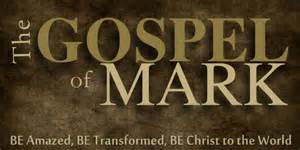
"Out of the heart come evil thoughts"
Scripture: Mark 7:14-23
14 And he called the people to him again, and said to them, "Hear me, all of you, and understand: 15 there is nothing outside a man which by going into him can defile him; but the things which come out of a man are what defile him." 17 And when he had entered the house, and left the people, his disciples asked him about the parable. 18 And he said to them, "Then are you also without understanding? Do you not see that whatever goes into a man from outside cannot defile him, 19 since it enters, not his heart but his stomach, and so passes on?" (Thus he declared all foods clean.) 20 And he said, "What comes out of a man is what defiles a man. 21 For from within, out of the heart of man, come evil thoughts, fornication, theft, murder, adultery, 22 coveting, wickedness, deceit, licentiousness, envy, slander, pride, foolishness. 23 All these evil things come from within, and they defile a man."
Meditation: Where does evil spring from and what's the solution for eliminating it from our lives? Jesus deals with this issue in response to the religious leaders' concern with ritual defilement -- making oneself unfit to offer sacrifice and worship to God. The religious leaders were concerned with avoiding ritual defilement, some no doubt out of fear of God, and others out of fear of pleasing other people. Jesus points his listeners to the source of true defilement -- evil desires which come from inside a person's innermost being. Sin does not happen. It first springs from the innermost recesses of our thoughts and intentions, from the secret desires which only the individual soul can conceive. God in his mercy sent his only Son Jesus to save us from our sins. But to receive his mercy, we must admit our faults. "If we say we have no sin, we deceive ourselves, and the truth is not in us. If we confess our sins, he is faithful and just, and will forgive our sins and cleanse us from all unrighteousness" (1 John 1:8-9). Only God can change our hearts and make them clean and whole through the power of the Holy Spirit. Like a physician who probes the wound before treating it, God through his Word and Spirit first brings it to light that we may recognize it for what it is and call upon his mercy and grace for pardon and healing. The Spirit of truth is the Consoler. The Spirit gives us the gift of the truth of conscience and the gift of the certainty of redemption in Jesus Christ.
When Cain was jealous of his brother, Abel, God warned him to guard his heart: "Sin is couching at the door; it's desire is for you, but you must master it" (Genesis 4:7). Do you allow any sinful desires to couch at your door? We do not need to entertain or succumb to sinful desires or thoughts, but instead, through the grace of God, we can choose to put them to death rather than allow them mastery over us. The Lord is every ready to change and purify our hearts through his Holy Spirit who dwells within us. His power and grace enables us to choose what is good and to reject what is evil. Do you believe in the power of God's love to change and transform your heart?
"Lord, fill me with your Holy Spirit and make my heart like yours. Strengthen my heart and my will that I may I choose to love what is good and to hate what is evil."


 bi
bi.jpg)
.jpg)